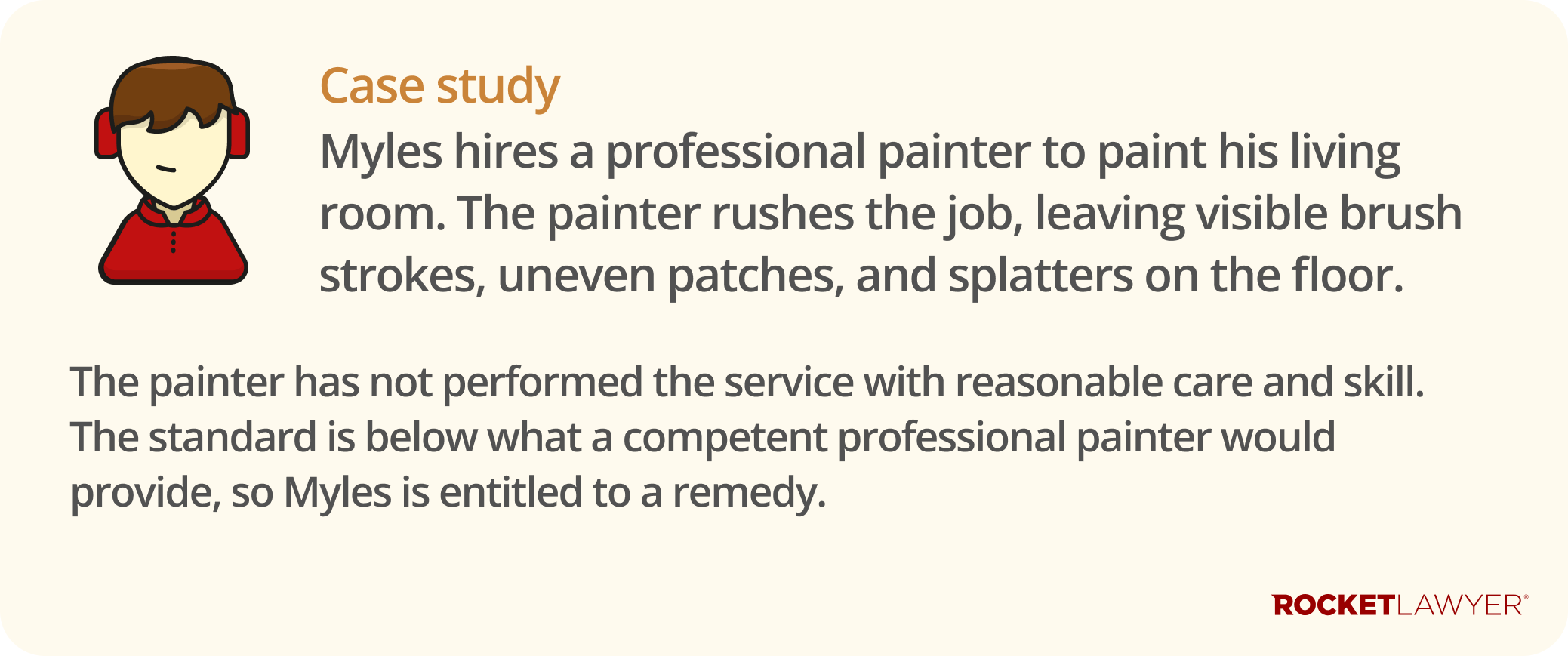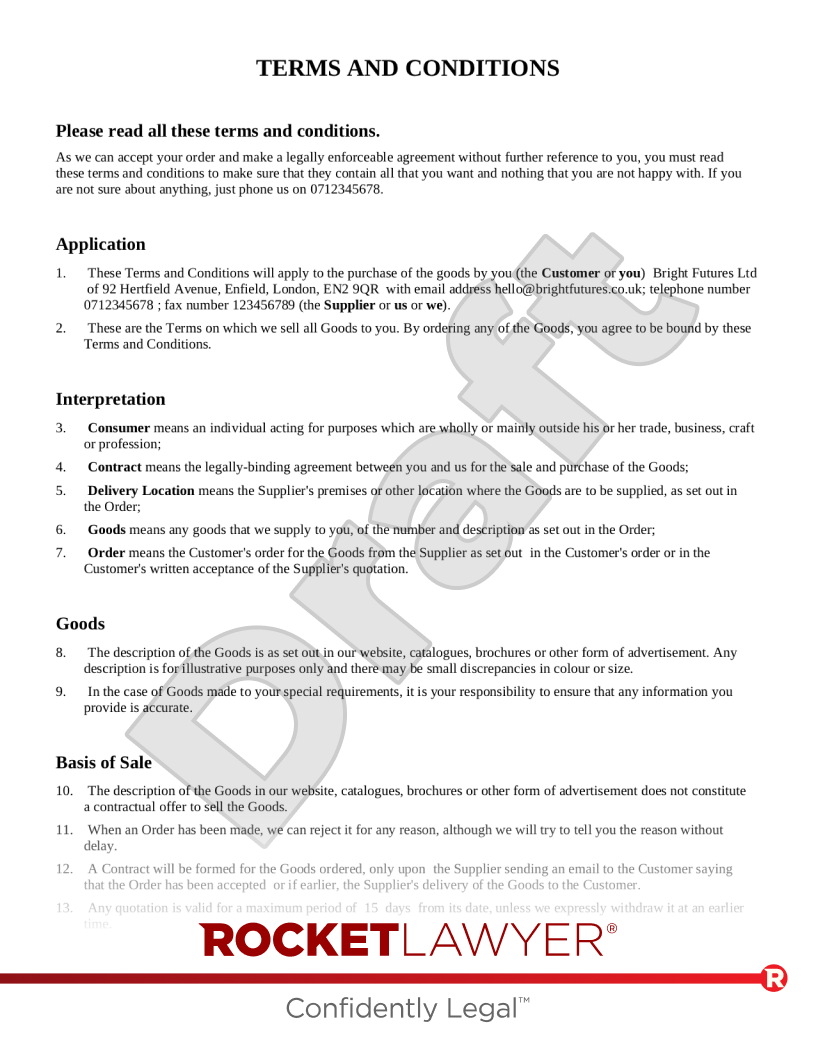What are the rules for supplying services to consumers?
The law that governs the supply of services to consumers is the Consumer Rights Act 2015 (the CRA). The CRA sets out minimum standards that businesses must meet. These standards are known as statutory rights. They are implied terms in every contract you have to supply services to a consumer. This means they apply automatically by law, whether or not they’re written down in your terms and conditions. You cannot ignore or exclude these rights.
It’s important to remember that these rules only apply when you’re dealing with a consumer. A consumer is an individual acting for purposes that are wholly or mainly outside their trade, business, craft, or profession. If you're providing services to another business (under a B2B contract), different rules apply. For more information, read Contracts for customers or Ask a lawyer.
What are a consumer's key rights for services?
When you supply a service to a consumer, their key statutory rights are that the service must be carried out with reasonable care and skill, for a reasonable price, and within a reasonable time. Any information you provide about your business or the service is also legally binding.
The service must be carried out with reasonable care and skill
This is one of the most important standards. It means your work must be of a standard that a reasonably competent professional in your trade or industry would provide. For example, a competent electrician would be expected to wire a new socket safely and correctly. This doesn’t mean the work must be perfect, but it must be of an acceptable standard. If you hold yourself out as having a particular skill (eg you’re a specialist web designer), the law will expect a higher standard from you compared to a generalist.

Information you provide is legally binding
Anything you say or write to a consumer about your business or the services can become a legally binding part of the contract if the consumer takes it into account when deciding to go ahead with the service. This can include things said in a conversation, written in an email, or stated on your website. For example, if you tell a customer that their car will be fully valeted by 5pm, this becomes a binding term of the contract.
The service must be performed for a reasonable price
If a price wasn’t agreed before you start the service, the law says you can only charge a reasonable price. What is reasonable will depend on the facts of the situation, for example, by looking at what other similar businesses would charge for the same service. To avoid any disputes, it’s always best practice to agree on a fixed price or a clear pricing method (eg an hourly rate) with the consumer upfront. You can do this by providing the consumer with a clear quotation before starting any work.
The service must be completed within a reasonable time
If you do not agree on a specific completion date or timeframe with the consumer, you must carry out the service within a reasonable time. What counts as a reasonable time will depend on the type of service being provided. For example, a simple haircut should be completed much faster than a complex loft conversion.
Does the 14-day cooling-off period apply to services?
Separate from the rights related to the quality of a service, consumers often have a right to simply change their minds. Under the Consumer Contracts (Information, Cancellation and Additional Charges) Regulations 2013, consumers have a 14-day cooling-off period for most service contracts agreed at a distance (eg online or over the phone) or off-premises (eg at the consumer’s home). This allows them to cancel the contract for any reason within 14 days of entering into it. It's important to note that this right can be lost if the consumer agrees to the service starting within the 14-day period and the service is then fully completed. For more detailed information on this cooling-off period, read Consumer rights.
What happens if I don't meet the standards for services?
If you breach any of the consumer’s statutory rights (eg the service wasn’t done with reasonable care and skill), the consumer is legally entitled to a remedy. The main remedies are the right to repeat performance and the right to a price reduction.
The right to repeat performance
The consumer’s first right is to ask you to perform the service again to fix any issues. This is known as the right to repeat performance. You must do this:
-
at your own cost
-
within a reasonable time
-
without causing the consumer significant inconvenience
What counts as a reasonable time and significant inconvenience will depend on the circumstances. For example, a customer would expect a faulty car repair to be fixed much more urgently than a misprinted business card. If it's impossible to repeat the performance (eg a wedding cake that was ruined on the day of the wedding), the consumer can move straight to the next remedy.

The right to a price reduction
A consumer can claim a price reduction if:
-
it is impossible to repeat the performance of the service
-
you fail to repeat the performance of the service within a reasonable time and without significant inconvenience to them
The amount of the price reduction will depend on how serious the breach was. It can be anything up to 100% of the price, which would be a full refund. For example, if a caterer provides food that causes food poisoning, a consumer would likely be entitled to a full refund.
Can I limit my liability in my terms and conditions?
No, you cannot limit liability in your terms and conditions. A term in a consumer contract that tries to exclude or limit your liability for breaching the consumer’s statutory rights is not binding on the consumer. For example, you can't have a clause in your Terms and conditions that says ‘we are not responsible for any work that isn’t carried out with reasonable care and skill’. Such a term would be considered unfair under the CRA and would be unenforceable. You are always responsible for meeting the minimum legal standards.
To ensure your business is protected and your customers are clear on the terms of your service, it's good practice to have the right legal documents in place. You can make personalised Terms and conditions for supply of services to consumers and/or Terms and conditions for supply of services to consumers via a website, or set out the scope of a particular job using an Engagement letter. If you have any questions or concerns about your legal obligations when dealing with consumers, do not hesitate to Ask a lawyer.




